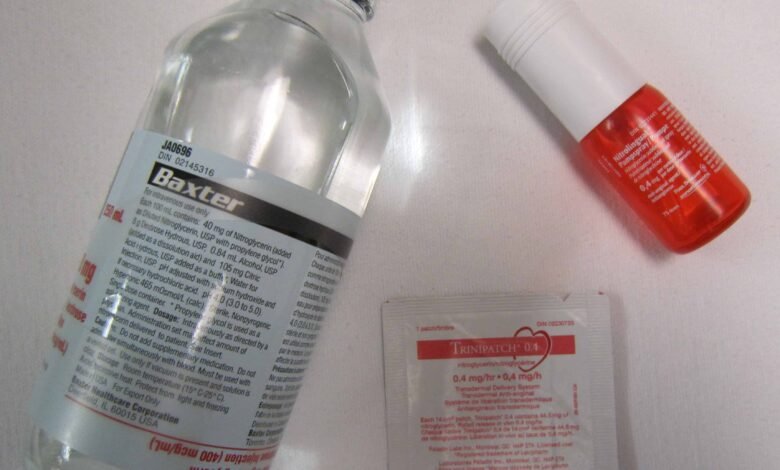Angina

What is the condition of angina?
Angina is a condition in which the flow of oxygen-rich blood to the heart is restricted. It is usually first felt in the chest, but can also be felt in the shoulders, arms, neck, throat, jaw, or vice versa.
Angina is also known as angina pectoris or translated from Latin it means squeezing or covering the chest and is characterized by chest pain that is caused by insufficient oxygen in the blood flow that the heart muscle receives.
The heart is supplied with blood by the coronary arteries, and if they are narrowed, the reduced blood flow means that the heart muscle receives less oxygen than it needs to function properly.
The initial symptoms of angina are pain, discomfort that starts in the chest – starts behind the sternum. Sensations of pressure, pressing, burning or tightness are also observed at the beginning in most of the patients.
As the disease progresses, the symptoms of angina also change – nausea, a constant feeling of fatigue, shortness of breath, sweating, weakness or weakness.
Diabetics are more likely to feel short of breath and at the same time feel angina pain.
Elderly patients may become weak, have difficulty breathing, have frequent dizziness and feel confused.
Angina is a rather dangerous disease that can damage the heart muscle in the long term.
Most doctors prescribe strong antibiotics to their patients for angina, which, however, lead to a strong weakening of the immune system, and therefore some home remedies that are also prove to be a much more effective means of treatment.
Home Remedies for Angina
- A tablespoon of onion juice in the morning on an empty stomach is very effective in relieving angina.
- Grapes strengthen the heart muscle. Grape juice reduces the risk of a heart attack and from it the chest pain of angina decreases and breathing becomes normal.
- Amla or Indian “Gooseberry” is a natural source of vitamin B. It takes one glass of juice daily or if it is in powder form, it is diluted in a glass of water. This is very useful for the prevention of cardiovascular diseases.
- Take fresh leaves of the herb Holy Basil and extract some juice from them, mix it with lukewarm water and add some honey. This is considered to be the strongest natural remedy against angina.
- Two cloves of garlic with milk daily is a very effective remedy for angina and other heart diseases.
- By taking 400 international units of Vitamin E daily, you will reduce the level of cholesterol in the blood and so it will not stick to your arteries.
- Limit the amount of salt , which you take, because if you put a lot of salt in your food, you will raise your blood pressure and this will make your angina chest pain worse.
Guidelines for changing your angina diet
Ginger
Ginger is known for its powerful medicinal properties, which are due to the active ingredient gingerol.
This ingredient has been scientifically proven to have the ability to inhibit arterial infections, lower cholesterol levels and prevent the formation of clots and thrombi.
Incorporating ginger into your daily diet can be extremely beneficial, especially for people who are at risk of cardiovascular disease.
One of the easiest ways to incorporate ginger into your diet is by adding a teaspoon of freshly grated ginger or ginger powder to salads and to the foods you prepare.
Ginger can be added to a variety of dishes, including soups, sauces, marinades and desserts. Its unique taste adds an extra touch to any dish while improving overall health.
Furthermore, ginger can also be used as a drink. Freshly grated ginger can be added to hot water to make a healthy and refreshing tea.
This tea not only helps improve blood circulation, but is also known for its anti-inflammatory properties that can help treat a variety of health problems, including arthritis and digestive disorders.
Eat legumes and baked beans
Baked beans are extremely rich in vitamins, minerals and proteins, which are essential for maintaining a healthy lifestyle.
One of the biggest benefits of eating baked beans is that they can help reduce the risk of heart disease.
Incorporating baked beans into your diet at least four times a week can have significant heart health benefits.
That’s because baked beans are rich in folate and manganese, two nutrients that are essential for heart health.
Folic acid helps regulate blood levels of the amino acid homocysteine, which in elevated amounts can increase the risk of heart disease.
Manganese, in turn, supports energy production in cells and supports the healthy function of the nervous system.
In addition, baked beans are rich in dietary fiber, which helps maintain healthy cholesterol and blood pressure, further reducing the risk of heart disease.
Fiber also aids digestion and may help prevent obesity, another risk factor for heart disease.



